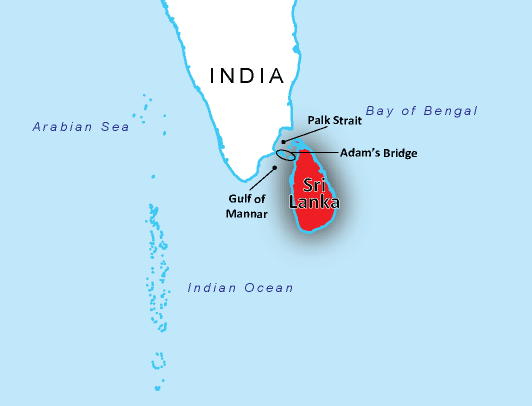West Container Terminal Offer to India-Japan: Sri Lanka | 04 Mar 2021
Why in News
Sri Lanka has decided to offer the West Container Terminal (WCT) to Indian and Japanese companies.
- The decision comes a month after the Sri Lanka government ejected the two partners from a 2019 tripartite agreement to jointly develop the East Container Terminal (ECT), citing resistance to “foreign involvement”.
Key Points
- About:
- Sri Lanka has approved the proposal to develop the WCT on Build, Operate and Transfer (BOT) basis for a period of 35 years as a public-private partnership with India’s Adani Ports and Special Economic Zone Limited and its local representative in Sri Lanka. Japan is yet to name an investor.
- Stakes:
- In the ECT project agreed upon earlier, the Sri Lanka Ports Authority (SLPA) was to hold a majority 51% stake, but in the WCT proposal, India and Japan will be accorded 85% stake.
- This is similar to the terms set for the Colombo International Container Terminal (CICT), where China Merchants Port Holdings Company Limited holds 85% stake.
- Significance:
- The WCT is adjacent to the China-run CICT and just a couple of kilometres away from the China-backed Port City being built on reclaimed land, making it a strategically desirable spot for India, whose concerns over China's presence in Sri Lanka are well known.
- It will support India in accomplishment of its strategic vision (SAGAR) for the Indian Ocean, ‘Neighbourhood First policy’, and in countering China’s String of Pearls strategy.
- Colombo’s alternative comes at a time when Sri Lanka is seeking support at the ongoing UN Human Right Council session, where a resolution on the country's rights record will soon be put to vote.
India - Sri Lanka Relations
- Background: India-Sri Lanka relationship is more than 2,500 years old and both sides have built upon a legacy of intellectual, cultural, religious and linguistic intercourse.
- Support Against Terrorism: During the course of the civil war, India supported the right of the Government of Sri Lanka to act against terrorist forces.
- Support For Rehabilitation: The Indian Housing Project is Government of India’s flagship project of developmental assistance to Sri Lanka. Its initial commitment is to build 50,000 houses for those affected by the civil war as well as for the estate workers in the plantation areas.
- Assistance during Covid-19: The Reserve Bank of India (RBI) had signed an agreement for extending a USD 400 million currency swap facility to Sri Lanka to boost the foreign reserves and ensure financial stability of the country, which was badly hit by Covid 19 pandemic. Recently, India has also supplied Covid-19 Vaccines to Sri Lanka.
- Joint Exercises: India and Sri Lanka conduct joint Military (Mitra Shakti) and Naval exercise (SLINEX).
- Participation in Groupings: Sri Lanka is also a member of groupings like BIMSTEC (Bay of Bengal Initiative for Multi-Sectoral Technical and Economic Cooperation) and SAARC in which India plays a leading role.

